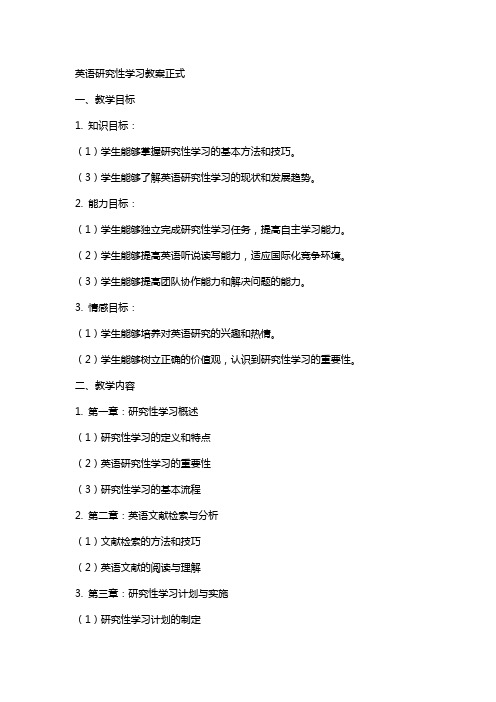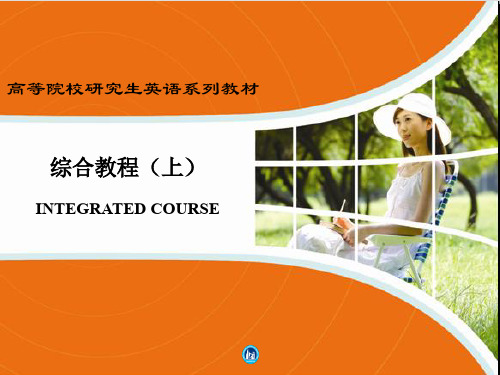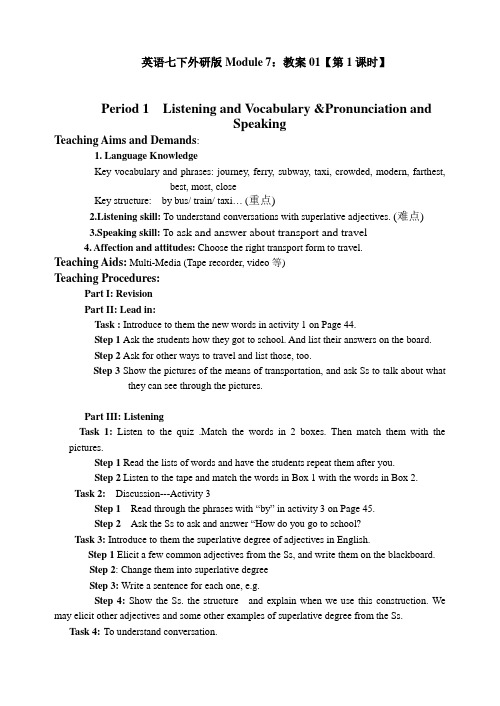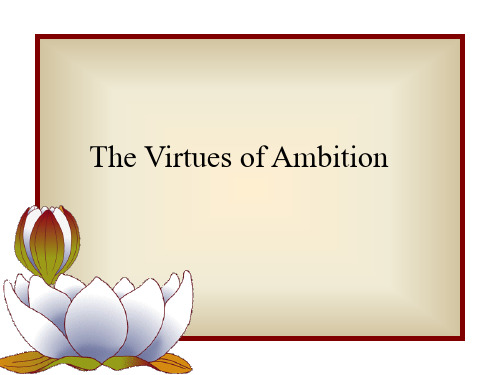研究生英语教案7
英语研究性学习教案正式

英语研究性学习教案正式一、教学目标1. 知识目标:(1)学生能够掌握研究性学习的基本方法和技巧。
(3)学生能够了解英语研究性学习的现状和发展趋势。
2. 能力目标:(1)学生能够独立完成研究性学习任务,提高自主学习能力。
(2)学生能够提高英语听说读写能力,适应国际化竞争环境。
(3)学生能够提高团队协作能力和解决问题的能力。
3. 情感目标:(1)学生能够培养对英语研究的兴趣和热情。
(2)学生能够树立正确的价值观,认识到研究性学习的重要性。
二、教学内容1. 第一章:研究性学习概述(1)研究性学习的定义和特点(2)英语研究性学习的重要性(3)研究性学习的基本流程2. 第二章:英语文献检索与分析(1)文献检索的方法和技巧(2)英语文献的阅读与理解3. 第三章:研究性学习计划与实施(1)研究性学习计划的制定(2)研究性学习任务的分配与执行(3)研究性学习过程的监控与评价(1)研究报告的结构和内容(2)英语写作技巧与规范(3)研究报告的修改与完善5. 第五章:英语研究性学习成果展示与评价(1)成果展示的形式与技巧(2)评价标准与评价方法(3)成果展示的反馈与改进三、教学方法1. 讲授法:讲解研究性学习的基本概念、方法和技巧。
2. 案例分析法:分析典型英语研究性学习案例,引导学生学会分析问题和解决问题。
3. 小组讨论法:分组进行讨论,培养学生的团队协作能力和口头表达能力。
四、教学评价1. 过程评价:评价学生在研究性学习过程中的表现,如团队合作、问题解决等。
2. 成果评价:评价学生的研究报告质量,如内容完整性、语言表达准确性等。
3. 综合评价:结合过程评价和成果评价,对学生的综合能力进行评价。
五、教学资源1. 教材:英语研究性学习指导书籍。
2. 参考文献:英语研究性学习相关论文和专著。
3. 网络资源:英语研究性学习相关网站和数据库。
4. 教学工具:投影仪、电脑、白板等。
六、第六章:研究性学习的评价与反馈(1)评价标准的设定:介绍如何制定科学、合理的评价标准,以保证评价的公正性和有效性。
高等学校研究生英语综合教程上Unit 7

综合教程(上)
INTEGRATED COURSE
高等学校研究生英语综合教程上 Unit 7
Unit 7
Exploring Human Nature
高等学校研究生英语综合教程上 Unit 7
Content
Starting out Reading Focus Reading More Practical Translation Focused Writing Final Project
高等学校研究生英语综合教程上 Unit 7
Starting out—Task 2
Task 2
The following viewpoints concerning human nature were contended by three prominent philosophers in ancient China. Who do you agree with? Do you agree completely or partly? Give specific examples to support your opinion. (P191)
Questions for discussion: 1. What made Jimmy become a thief before his arrest? 2. Was it his destiny, his nature, his life experience,
living environment or something else thaห้องสมุดไป่ตู้ shaped his behavior?
Mencius: human nature is good, and people are naturally
研究生英文教案模板范文

---Course Title: Advanced English CompositionCourse Code: ENG 501Instructor: [Instructor's Name]Department: English Language and LiteratureCredit Hours: 3Semester: Fall 2023Class Hours per Week: 2Total Hours for the Course: 48---I. Course OverviewThis course is designed to enhance the writing skills of graduate students, focusing on advanced writing techniques, critical thinking, and academic integrity. Students will engage in a variety of writing tasks, including research papers, analytical essays, and professional communication. The course aims to prepare students for academic and professional writing environments.---II. Course ObjectivesUpon completion of this course, students will be able to:1. Demonstrate advanced writing skills, including argumentation, analysis, and synthesis.2. Conduct in-depth research and critically evaluate sources.3. Compose research papers and analytical essays adhering to academic standards.4. Develop effective communication skills for academic and professional settings.5. Understand and adhere to ethical standards in academic writing.---III. Course Content1. Introduction to Advanced Writing- Understanding academic discourse- Developing a strong thesis statement- Effective use of evidence2. Research and Critical Analysis- Identifying and evaluating academic sources- Analyzing and synthesizing information- Developing a research question3. Writing the Research Paper- Outlining and structuring the paper- Writing the introduction and conclusion- Formatting and referencing4. Analytical Essays- Identifying the main arguments of a text- Developing a persuasive thesis- Using evidence to support the argument5. Professional Communication- Writing emails and memos- Preparing presentations- Engaging in academic discussions6. Ethics in Academic Writing- Plagiarism and academic integrity- Citing sources correctly- Ethical considerations in research---IV. Teaching Methods1. Lectures: The instructor will provide lectures on key concepts and techniques.2. Discussions: Students will engage in class discussions to explore and analyze various topics.3. Workshops: Hands-on sessions to practice writing skills and receive feedback.4. Peer Review: Students will review each other's work to provide constructive criticism.5. Individual Consultations: The instructor will offer individual consultations to address specific student needs.---V. Assessment1. Research Paper (30%): A comprehensive research paper on a topic of the student's choice.2. Analytical Essay (25%): An essay analyzing a given text, demonstrating critical thinking and argumentation skills.3. Midterm Exam (15%): A written exam assessing understanding of course content and writing skills.4. Final Exam (15%): A comprehensive exam covering the entire semester's content.5. Participation and Attendance (15%): Active participation in class discussions, workshops, and peer reviews.---VI. Course ScheduleWeek 1-2: Introduction to Advanced WritingWeek 3-4: Research and Critical AnalysisWeek 5-6: Writing the Research PaperWeek 7-8: Analytical EssaysWeek 9-10: Professional CommunicationWeek 11-12: Ethics in Academic WritingWeek 13-14: Midterm Exam and ReviewWeek 15-16: Preparation for Final ExamWeek 17-18: Final Exam---VII. References- Bruffee, K. A., & Hulteen, M. J. (2006). College Writing for the New Millennium. New York: W.W. Norton &。
高等学校研究生英语综合教程上Unit7

inclined toward virtue. Unfortunately, the negative elements of society tend to corrupt many people, and only a few are able to overcome them.
Reference: Animal instinct is ruled by desires, emotions and needs that have to be fulfilled regardless of the time and place. While human nature, which is also driven by those needs, emotions and desires, is mostly controlled by brain, which is related to logic, morals, backgrounds, religions, etc. When control is not present, our nature is basically nothing but animal instinct.
Starting out- Task 1
Based on what you’ve listed above, discuss with your partner the differences between human beings and other animals in terms of their nature and instincts. (P191)
Background Information
英语七下外研版Module7教案01【第1课时】

英语七下外研版Module 7:教案01【第1课时】Period 1 Listening and Vocabulary &Pronunciation andSpeakingTeaching Aims and Demands:1. Language KnowledgeKey vocabulary and phrases:journey, ferry, subway, taxi, crowded, modern, farthest,best, most, closeKey structure: by bus/ train/ taxi… (重点)2.Listening skill: To understand conversations with superlative adjectives. (难点)3.Speaking skill: To ask and answer about transport and travel4. Affection and attitudes: Choose the right transport form to travel.Teaching Aids: Multi-Media (Tape recorder, video等)Teaching Procedures:Part I: RevisionPart II: Lead in:Task : Introduce to them the new words in activity 1 on Page 44.Step 1 Ask the students how they got to school. And list their answers on the board.Step 2 Ask for other ways to travel and list those, too.Step 3 Show the pictures of the means of transportation, and ask Ss to talk about what they can see through the pictures.Part III: ListeningTask 1: Listen to the quiz .Match the words in 2 boxes. Then match them with the pictures.Step 1 Read the lists of words and have the students repeat them after you.Step 2 Listen to the tape and match the words in Box 1 with the words in Box 2.Task 2: Discussion---Activity 3Step 1 Read through the phrases with “by” in activity 3 on Page 45.Step 2 Ask the Ss to ask and answer“How do you go to school?Task 3: Introduce to them the superlative degree of adjectives in English.Step 1 Elicit a few common adjectives from the Ss, and write them on the blackboard.Step 2: Change them into superlative degreeStep 3: Write a sentence for each one, e.g.Step 4: Show the Ss. the structure and explain when we use this construction. We may elicit other adjectives and some other examples of superlative degree from the Ss.Task 4:To understand conversation.Step 1: Give the Ss 2questions:How does Tony get to school?Does Dad always go to work by taxi?Make sure the Ss. understand the question:Step 2: Play the recording and have them listen.Step 3: Play the recording again and have them write the answers individually.Step 4:. Have them check their answer with a partner and Call back the answer from the whole class.Task5: Activity 5 on Page 45.Step 1: Play the recording again and have them write a name in front of each sentence individually in Activity 5. Have them check their answers with a partner Step 2: Play the recording again . Have them check their answers with a partnerStep 3: Call back the answer from the whole class.Task 6: Listen and read:Step 1: Play the recording and ask the Ss. to listen and read the conversation.Step2:Play the recording again and pause after each phrase, asking the Ss. to repeat chorally and individually.Step3:Put the Ss. into groups of 2 to practice the dialogue.Step4: They should repeat it several times, changing the roles each time.Part IV: PronunciationTask: Listen and repeat the sentences in Activity6、7、8Step 1: Play the recording and ask the Ss. to listen and repeat the sentences in activities.Step 2: Ask the Ss to work in pairs to check their answers to activity 5.Step 3: Work in pairs to do activity 8.Part V Homework:Recite the short dialogue as fluently as possible.Copy the new words and finish the exercise in the workbook.教学后记:。
研究生英语课件Unit7

Introdution to the Text
The Virtues of Ambition
Introduction to the Author
• Joseph Epstein(1937-), noted essayist,short story author and novelist, was born in Chicago and grew up in Rogers Park. He then attended the University of Chicago and is now a promineng member of the literature faculty at Northwestern University.
• Perhaps one of the cleverest writers of our times, Epstein specializes in the personal or familiar essay.
• His insightful and penetrating observations and wry prose combine to make him one of the most enjoyable contemporary authors. He has also written short fiction, as well as a number of works of literary criticism.
高等学校研究生英语系列教材综合教程上Unit 7
Starting out
got up and slowly walked on home And so I ___ And mama saw the tears ____ and said, What's wrong? And so to keep from telling her a ____ lie I just said sa-a-a-d movies make me cry Oh-oh-oh sa-a-a-d movies always make me cry Oh-oh-oh sa-a-a-d movies always make me cry Ooh, ooh, ooh, ooh, ooh Ooh, ooh, ooh, ooh Sa-a-a-d movies make me cry
Starting out
Task 1
What distinguishes human beings from other animals? Work with your partner to list the behavior that is unique to human beings, that is unique to other animals and that they have in common. (P191)
Starting out-Task 3
Task 3 Read the following story about Jimmy and discuss with your partner the questions that follow the story. (P192) Questions for discussion: 1. What made Jimmy become a thief before his arrest? 2. Was it his destiny, his nature, his life experience, living environment or something else that shaped his behavior?
研究生英语综合教程(上)Unit-7-Ex
综合教程(上)
INTEGRATED COURSE
2021/6/4
1
Unit 7
Exploring Human Nature
2021/6/ure
2021/6/4
3
Reading Focus – Global Understanding
13. The _c_r_im__i_n_a_l _ was sent to prison for 10 years.
14. Lisa is deaf in one ear and __p_a_r_ti_a_ll_y_ blind.
15. His modesty is _p_r_o_v_e_r_b_ia_l___.
4. It would be unwise to _d_r_a_w__c_o_n_c_lu_s_i_o_n_s_f_ro_m___th_e__r_e_su_l_t_s_o_f_ _a__si_n_g_l_e_s_u_r_v_e_y__ (仅凭一次调查结果就得出结论).
2021/6/4
13
Reading Focus – Vocabulary in Action
___H_u__m__a_n__n_a_t_u_r_e__d_o_e_s__n_o__t _a_n_d__c_a_n__n_o_t__c_h_a_n_g__e_;_w__e__c_a_n______ ___o_n_l_y__e_n_d_e_a__v_o_r__to__u__n_d_e_r_s_t_a_n_d__m__a_n__a_s__h_e__i_s_. ______________
1 Introduction (Para. 1)
2 Body (Paras. 2-9)
《英语》教案 Unit7 I’m sorry
Unit7 I’m sorryThe First Period第1课时Topic:New words of Unit 7Aims and Demands:1.Let the Ss listen and read the new words.2.Explain and use the main knowledge.Type of Lesson:New one Teaching Methods:Teaching and practicingTeaching Procedures:(一)Organization(二)Act out the dialogues(三)Leading:(四)New Content:Step 1Listen to the recording and read after it.Step 2Let the Ss read the new words one by one.Step 3Read new words after the teacher.Step 4Explain some main words.Step 5:Sum upStep 6:Today’s homeworkThe Second Period第2课时Topic:I’m SorryAims and Demands:1.Master some new words2.Learn functionsType of Lessons:New OneTeaching Methods:Communicative approachTeaching Tools:Tape recorderTeaching Procedures;Step 1Ask sts to read through the conversation firstStep 2Play the recording Sts should look at the table while listening . They can tick the sentences they hear while listeningStep 3LANGUAGE POINTS1、to make an apology for sth e.g. : He made a public apology for the team’sperformanceto apologize to sb for sthe.g. He apologized to the public for the team’s performance2、to face sth : to deal with sth instead of turning away from ite.g. The prevident faces the difficult task of putting the economy talk on its feet3、to tell the tntch , I don’t want to go to the more with the class4、to work hard at sth e.g. He is working hard at his drawing(五)Conlidation(六)Sum Up本节课通过两个听说任务,我们主要学习了道歉的交际功能,如:I’d like apologizefor ……, I have an apology to make . I’m afraid ……另外还学了几个重要的知识点如:make an apology for sth ; face sth ; to tell the tncth ; work hard at sth (七)Homework(八)Self Of ExaminationThe Third Period第3课时Topic:Read and write : Task 1Aims and Demands:1、Master some new words and language points2、Understand the textKeys And Difficulties:some language pointsThe main idea of the textType of Lessons:new one Teaching Methods:teaching Teaching Tools:Multi-media Teaching Procedures:(一)Organization(二)Revision And Questions:How to express apology ? (三)Leading:A number of bad things happened to Fred today . He was in very low spirits by the end of the day . Read the following passage and try to make some suggestions to help Fred with his problems(四) New Content Step1Ask sts to look at the TIF statements below the textStep2Ask sts to read each paragrapy of the text aloud and finish the taskStep3Check answers Step4LANGUAGE POINTS1、in low sprits 情绪低落反义词组是in good spirits/in high spirits2、dive away : force sb to leave 赶走e.g. It took Chinese people eight years to ~ the Japanese3、turn againt : stop supporting , trusting or liking sb / sthe.g. They used to be friends . But they turned against each other duce to a small mather4、….used broken like as an excuse…e.g. Mother used old socks as dusters(五)Conlidation understanding the text(六)Sum Up本节课我们通过读写学习饿一些重要词组,如:bad things happened to sb , in low spirits . drive away . as usual . have no desire to do sth . go straight up to sb . turn against have a good look ata sb(七)Homework(八)Self Of ExaminatioUnit8 Television课时数:6课时Aims and Demands:1、Develop the ability of “listening speaking reading and writing”2、Master some new words and language points3、Master Attobutire Clause4、Learn the exptossions about Asking for or giring opinionsKeys And Difficulties:This unit put emphasis on listening and reading comprehension . Difficult point is grasping the main ides of the textTeaching Methods:1、Suitable teaching methods2、Let sts master some techque of listening and reading3、Combine listening speaking reading and writingTeaching Periods:Word list 1periodListen and speak :Task 1 2 1periodRead and write : Task 1 1periodRead and write : Task 2 1periodGrammar 1periodReview 1periodTest 1periodThe First Period第1课时Topic:New words of Unit 8Aims and Demands:1.Let the Ss listen and read the new words.2.Explain and use the main knowledge.Type of Lesson:New oneTeaching Methods:Teaching and practicingTeaching Procedures:(一)Organization(二)Act out the dialogues(三)Leading:(四)New Content:Step 1Listen to the recording and read after it.Let the Ss read the new words one by one.Step 3Read new words after the teacher.Step 4Explain some main words.Step 5:Sum upStep 6:Today’s homework.教后记:The Second Period第2课时Topic:L&S : Task 1 2Aims and Demands:1、Master some new words and phrases2、Learn functionsType of Lessons:new oneTeaching Methods:commanicative approachTeaching Tools:Tape-recorderKeys And Difficulties:Listening and speakingTeaching Procedures:(一)Organization(二)R evision And Questions(三)Leading:Look at the picture on the left . who are these people ? What do you think they are doing ? Try to answer these questions after you listen to the tape for the first time(四)New ContentStep 1Introduce the peopleMan in suitYoung manYoung womanMiddle aged womanStep 2Listen to the tape and fill in the following tableStep3Classroom activityTV news . Animal world . cartoons . comedy showListen and speak : Task 2Step1Play the tape . Ask the sts to have their looks open to the place where the incomplete paragraph is and be ready to write down words for the blanks as they listenClassroom activity : group discussionDiscussion questions1、Do you study English with the help of TV?2、Do you think TV can help you in your English study ?3、In what way can TV help you in your English study ?(五)Conlidation(六)Sum Up本节课通过两个听力练习我们学习了有关询问意见的表达方法如:Can I have your apinion about ……? What do you think …..? I think …. I agree with ….. I don’t agree with ….(七)Homeworkcan use the exprossions(八)Self Of ExaminationThe Third Period第3课时Topic:Read and write : Task 1 2Aims and Demands:1、Master some new words and phrases2、Have a connect knowledge of TVKeys And Difficulties:some sentences the main idea of the textType of Lessons:new oneTeaching Methods:teachingTeaching Procedures:(一)Organization(二)Revision And Questions:How to ask for give apivions (三)Leading:Today , there is a TV sat in nearly every home . People watch TV every day , and some people watch it from marning till night . But is TV gook or bad you ?People have different opinions . Read what some American sts say . Then finish the following two tasks(四)New Content Read and write : Task 1Step1Ask the sts to read the list of poinions . Help them understand the statements LANGUAGE POINTS1、They don’t want to think2、A lot of violenceStep2Help sts devide what opinions are positive , what are negativeStep3Get sts to say whether they agree or disagree with the statements(五)Conlidation(六)Sum Up本节课我们学习了人们对电视的认识,除此我们还学了几个重要的词组,如:Play a part in , fields of study , as well as , take up , no longer , pay attention to , get used to , be dependent on sth(七)Homework(八)Self Of ExaminationThe Fourth Period第4课时Read and write : Task 2Step1Ask sts to read the text quickly to have a general understanding of the textStep 2Ask sts to faucs on advantage and disadvantagesStep3LANGUAGE POINTS1、advantage : a condition giving a greater chence of success2、benefit : to give a helpful or good effectHow can we benefit those who most need our help ?The new hospital will benefit from the new hospital3、take up : oucpy e.g. I won’t take up any more of your timeI can’t see you , my day is taken up with meetings4、no longer : not any longer : in the past but not nowe.g. The cinema is no longer used(五)Conlidation(六)Sum Up本节课我们学习了人们对电视的认识,除此我们还学了几个重要的词组,如:Play a part in , fields of study , as well as , take up , no longer , pay attention to , get used to , be dependent on sth(七)Homework(八)Self Of ExaminationThe Fifth Period第5课时Topic:定语从句:关系代词Aims and Demands:1、Learn the attributive clause2、Master the usage of the relative pronounsKeys And Difficulties:the usage of the relative pronounsType of Lessons:new oneTeaching Methods:teachingTeaching Procedures:(一)Organization(二)Revision And Questions1、She showed us the skirt she had just bought2、Children who watch a lot of TV can often comeritrate on a subject for only 15 to 20 minutes3、There are good programs that help us understand many fields of study(三)Leading由以上句子可以看出,划线部分都是由句子充当定语的,这些句子就叫做定语从句(四)New Content定语从句是句子的一部分,由关系代词或关系副词引导,用于修饰它前面的先行词,关系代词通常紧随被其修饰的先行词后面,在从句中一般作主语、宾语、定语等。
高等学校研究生英语综合教程上Unit7
Starting out
Task 1
What distinguishes human beings from other animals? Work with your partner to list the behavior that is unique to human beings, that is unique to other animals and that they have in common. (P191)
16
Reading Focus – Global Understanding
Body
_C_h_a_r_a_c_t_e_ri_s_ti_c_s_ of human nature
_A_._T_h_e_b_as_i_c_n_at_u_re_o_f_h_u_m_a_n_b_e_i_ng_s_d_o_e_s_n_o_t _an_d_c_a_n_n_o_t c_h_a_n_ge_.___ _B_. _N_o_o_n_e_w_i_sh_e_s_h_i_s _na_t_u_re_t_o_c_h_an_g_e_._____________________ _C_. _H_u_m_a_n _na_t_ur_e_is_e_v_e_r _tr_ue_t_o_it_se_l_f,_n_ot_t_o_s_ys_te_m_s_o_f_f_ai_th_o_r_e_du_c_a_tio_n_._ _D_. _T_h_e _c_on_s_ta_n_c_y_o_f_h_u_m_a_n_n_a_tu_r_e _is_p_r_o_ve_r_b_ia_l._______________ _E_. _H_u_m_a_n_n_a_tu_r_e_c_an__be__st_u_di_e_d_, c_o_n_tr_o_ll_ed__a_nd__d_ir_ec_t_ed_._________ _F_. M__a_n_’s_s_p_ir_it_is__pe_r_fe_c_t,_o_n_ly__th_e_p_e_rs_o_n_al_it_y_a_n_d_t_he__ph_y_s_ic_a_l _b_od_y__ ___be_c_o_m_e_i_m_p_e_rf_e_ct_. _________________________________ _G_. _M_a_n_’s_m__aj_e_st_y_a_n_d_n_o_bi_li_ty__ar_e_t_ak_e_n_f_o_r _g_ra_n_te_d_. _O_n_ly__be_h_a_v_io_r_s _
- 1、下载文档前请自行甄别文档内容的完整性,平台不提供额外的编辑、内容补充、找答案等附加服务。
- 2、"仅部分预览"的文档,不可在线预览部分如存在完整性等问题,可反馈申请退款(可完整预览的文档不适用该条件!)。
- 3、如文档侵犯您的权益,请联系客服反馈,我们会尽快为您处理(人工客服工作时间:9:00-18:30)。
Unit Seven Scarcity, Choice, and Opportunity Cost More About the Author Robert E. Hall (1943- ) is an applied economist with interests in technology, competition, employment issues, and economic policy in the aggregate economy and in particular markets. Hall is a member of the National Academy of Sciences, a fellow of both the American Academy of Arts and Sciences, and the Econometric Society. Before coming to Stanford Department of Economics in 1978, Hall taught at the Massachusetts Institute of Technology and at the University of California, Berkeley. Hall has advised a number of government agencies on national economic policy, including the Justice Department, the Treasury Department, and the Federal Reserve Board. He served on the National Presidential Advisory Committee on Productivity. He has testified on numerous occasions before congressional committees concerning national economic policy. For more information, please visit http://www.stanford.edu/~rehall/ Marc Lieberman is currently Clinical Associate Professor of Economics at New York University. He has presented his extremely popular Principles of Economics course at Vassar College, Harvard University, the University of California/Santa Cruz, and the University of Hawaii. Lieberman is co-editor and contributor to The Road to Capitalism: Economic Transformation in Eastern Europe and the Former Soviet Union. In addition, he has consulted with the Bank of America and the Educational Testing Service. In his limited spare time, he is an accomplished screenwriter. He co-wrote the script for Love Kills, a recent movie that aired on the USA Cable Network and is now available in video stores around the world. For more information, please visit www.econ.nyu.edu/dept/vitae/lieberman.pdf About the Text Students encounter the concept of scarcity in their daily tasks but comprehend little of this meaning or how to deal with the concept of scarcity. They should know that often life is 'this or that' not 'this and that'. This unit introduces the concept of scarcity by illustrating how resources — time and money, are finite and how life involves a series of choices. Specifically, this unit teaches students about scarcity and choice: Scarcity means we all have to make choices and all choices involve "costs." Not only do you have to make a choice every minute of the day because of scarcity, but, when making a choice, you have to give up something. This cost is called opportunity cost. Opportunity cost is defined as the value of the next best thing you would have chosen. It is not the value of all things you could have chosen. Choice gives us 'benefits' and choice gives us 'costs'. Not only do you have to make a choice every minute of the day, because of scarcity, but also, when making a choice, you have to give up something of value (opportunity cost). To be asked to make a choice between 'this or that ' is difficult for students who want everything. A goal in life for each of us is to look at our wants, determine our opportunities, and try and make the best choices by weighing the benefits and the costs. This unit explores the concept of opportunity cost, and illustrates how opportunity cost differs among different individuals. Finally, it points out that opportunity cost should be taken into consideration in every decision of individuals and society. Some paragraphs of the original essay are abridged to meet the teaching requirement. Structure of the Text Para. 1 ~ Para. 5: Introduction. The concept of scarcity and the relation between scarcity and the individual. Para. 6 ~ Para. 8: The relation between scarcity and society. Para .9 ~ Para. 12: The concept of opportunity cost. Para. 13 ~ Para. 18: Opportunity cost for individuals. Para. 19 ~ Para.20: Opportunity cost for society. Para. 21 ~ Para.22: The principle of opportunity cost. Teaching Suggestions INTRODUCING THE TOPIC Lead-in Questions This activity is designed to arouse students’ interest in the topic of the text. You can ask students to preview this unit by thinking over these questions after your last class and then check their answers by asking the questions with the class as a whole. Or students can be divided into groups to interview each other. They can choose some questions from the list or think of their own questions about the same topic to ask. If there is enough time, collect their ideas by choosing one or two groups to report the result of their interview to the class. Word Extension This activity is designed to give students practice in explaining things in their own words. Help them to give accurate definitions to the terms. Ask volunteers to give other relative words they know. Write all responses on the board. To save time, you can also ask them to prepare before class. Try to maintain a fast pace in this part and create an active atmosphere. MEETING THE AUTHOR Give a brief introduction to the author using your own words. Do not just read from the book. Emphasize the parts that relate to the topic of the text. COMMUNICATIVE ACTIVITIES In order to save time, students can be grouped to do different activities. Previous preparation is necessary. Activity One The answer is D, 2 sweaters. Remind the students that opportunity cost does not concern the typical time a typical worker in a given country used to produce one unit of a given good. Opportunity cost only refers to what we give up when we make that choice. Alternatives are at the core of the concept of opportunity cost. This activity is designed to make a distinction between the concept of opportunity cost and the typical time to produce one unit of a given good. The students should discuss this in group before the presentation of the answer and the explanation. Activity Two Remind students that the opportunity cost consists of the actual expenses and the earnings and experiences forgone. The actual expenses include expenditures on tuition and books, but not on room and board, which you will also consume without studying for a master’s degree. If the expenses of room and board on campus exceed what would have cost you to live at home, the extra cost would be counted as an expense. Furthermore, any scholarship funds or government grants should be deducted. PRACTICAL READING This part is designed to help students get useful information and practice in advertisements. Do
